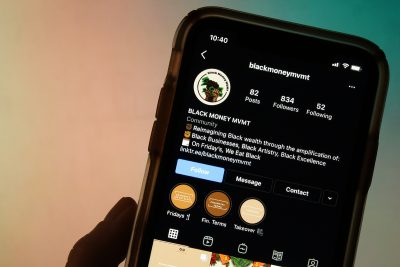With February comes Black History Month, a time when the country commemorates the history of the Black community and celebrates the possibility of the future.

On a local level, Black BU alumnae are making their own history in industries such as finance, psychiatry, education and catering.
BlackMoneyMVMT, an Instagram account and virtual community dedicated to promoting various Black-owned businesses, is one of them.
Founded by Gabrielle Lawson, a 2018 alumna of the Questrom School of Business, BlackMoneyMVMT is a virtual platform with the mission to elevate Black voices in business.
“The mission behind BlackMoneyMVMT is really to reimagine Black wealth through the amplification of Black businesses, Black artists and just Black excellence in general,” Lawson said.
Since its first post in June, the account has gained more than 840 followers and 80 posts, as well as a link tree with a large directory of Black-owned businesses from the top cities nationwide.
The directory was created in support of the “On Fridays, We Eat Black” campaign that encourages followers to buy from a Black-owned restaurant on a Friday and share their meals on Instagram.
Lawson said she created the account and campaigns after learning one dollar circulates for about six hours within Black communities while it can last up to 29 days in others.
“The approach to economic equity that we take is a collaborative one, meaning we lean not only on the Black community to build up the Black community from a financial standpoint,” she said, “but we also do lean on the support from our allied communities.”
Lawson said Black-owned businesses often face difficulties due to a lack of resources compared to other well-known brands.
“There’s a lack of accessibility and that’s because most Black businesses are small businesses,” Lawson said. “What BlackMoneyMVMT truly seeks to do is one we want to provide our audience and our community with resources on how they can buy Black.”
Tracie Pinnock, a 2008 alumna of the College of Arts and Sciences, also said it is important to support the Black community, especially for new businesses.
“It’s how you build a community, it’s how you can pay it forward as well,” Pinnock said. “Supporting other Black-owned businesses is definitely key.”
Pinnock currently owns and practices as a licensed marriage and family therapist at The Pursuit of Happiness Therapy LLC — a virtual psychotherapy practice where she works with women and couples, particularly helping women navigate life stressors such as breakups and losses.
She said she started her own practice after finding her niche in the therapy field, knowing she wanted to work for herself.
“I had also known for a couple of years now, at that time, that I wanted to eventually work for myself,” Pinnock said. “When I merged the idea of therapy and working for myself, it turned itself into a private practice.”
She said building this business is different from the retail business model — instead of creating products, she had to find clients who wanted her.
“Over a period of a few years, I transitioned myself into taking on more and more clients,” Pinnock said. “It was a gradual build up for me.”
Shironda White, a 2018 graduate of the Questrom MBA program, is the co-owner of Cupcake Therapy — an allergy-friendly, made-to-order cupcake business — and the CEO of CauseEDU, a college advising program to help families figure out a payment plan for college.
White said she launched CauseEDU in 2017 as a second-year in Questrom, after a friend — who had to take a leave of absence from college due to monetary reasons — helped students financially through crowdfunding.
After researching why students drop out of college, she said she found the true cost of secondary education was a large factor and launched a financial planning platform in March for families.
“The major reason was that most families [and] most students don’t understand how much college actually costs until they get there,” White said. “We started the platform to really address that.”
White said students thinking about starting their own businesses should make use of resources offered by BU.
“There are so many businesses that don’t start, especially students, because we think ‘We don’t have the funding, we don’t have the money,’” she said. “My advice in that respect would be number one, go for it, do it anyway and look at BU resources.”
She mentioned local pitch competitions, the Pathway Program, Summer Accelerator Program and the New Venture Competition as potential ways to achieve free funding.
When it comes to advice for students, it was simple: just start.
“Don’t wait another day, just do it,” White said. “Every business that succeeded, at least started. They all tried.”

















































































































